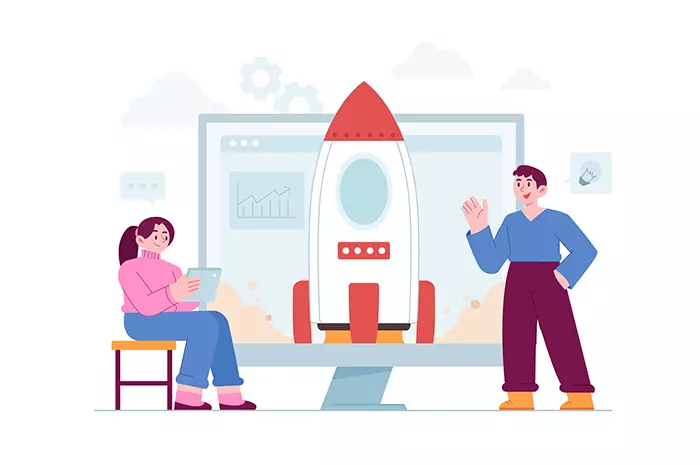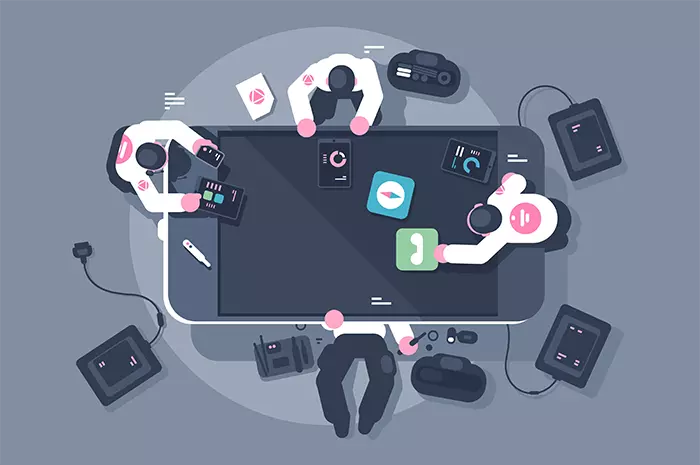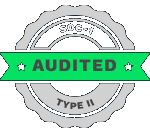There’s always talk of a new web app. You’ve probably overheard someone at a work party talking about how theirs is going to shake up their whole industry.
The launch of a new web application, however, is a challenging and complicated process. Whether you’re a mid-sized consulting firm or a funded startup, two questions are paramount for you to answer:
Is your app workable?
Is it marketable? You’ll require considerable skills for it to be “Yes” for both.
But what exactly is a web app? There is some confusion over the term.
For simplicity, we will use this definition: an interactive computer program that is built with web technologies such as CSS and HTML and manipulates and stores data. It is used by a single person or a team to perform tasks with the Internet.
As examples: Gmail, Pipedrive, and Notion are web apps, while Amazon, Facebook, and Wikipedia are not.
Learn more about Web App Development Services .
How to launch your web app
-
Step 1: Outline Your Vision
The first thing you should start with is your vision.
What does the basic version of your web app look like? Since this is the earliest iteration of your web app design, don’t be afraid to try different ideas until you find something that resonates with you.
If you’re already in the talks with your development team, this is a great time to start getting expert feedback.
-
Step 2: Begin Wireframing
A crucial part of the web app development process is app wireframing. This is often thought of as an X-Ray of your website, since its main job is to show the prominent components of any given page. This could simply be a pencil-and-paper extension of your results from Step 1, or it could be a clearly structured digital file on Photoshop.
Are you stuck at this phase? Give one of BluEnt’s developers a call for professional guidance on how to take your web app further.
-
Step 3: Settle on a Theme
This is where you hone in on how you want your website to make visitors feel, both at first glance and throughout their user experience. This should relate to the web app’s ultimate purpose.
Is it a web portal striving to maintain productivity for HR personnel?
Is it an e-commerce site for clothes and accessories?
These will inform the mood your overall design should inspire in your audience.
-
Step 4: Create a Mockup
It’s time to start creating the first mockup for what your web app will look like once it goes live.
This is where all the work you’ve done in sketching and wireframing comes together. Unlike the first two phases, however, it’s crucial to use sophisticated web app design tools like Photoshop so you get a true sense of the layout, colour palette, and flow.
Working with your app developers early will give you a clear sense of what features to include and how to make them easy to navigate for users. To learn about BluEnt’s approach, check out our client testimonials what client testimonials on our web app development services.
-
Step 5: Incorporate Web Design Trends
If you want your web app to be up to date, it’s best to do some research on the top UX & UI trends.
Trends aren’t just about aesthetics. Modern web application development revolves around constantly searching for new ways of achieving user-centric design.
From infinite scrolling to new-and-improved landing pages, talk to your developers about which of these techniques will help you achieve the results you’re looking for.
-
Step 6: Optimize Performance
After you’ve picked out some web design trends you like, it’s important to start balancing vision and performance.
Many features that do wonders for design are a huge burden for performance, such as large pictures, graphics, and animations. Slow page loading is a turn off for users and often leads to abandonment within seconds.
Furthermore, rich design elements often lower SEO rankings by virtue of being unreadable by search engine crawlers.
BluEnt has years of experience working with clients to develop a web app that perfectly meets their needs. We offer rich user interface design that is as fast loading as modern technology allows so that users don’t have to sacrifice quality for speed.
Our in-house SEO experts guarantee that our web app development process is search engine-approved, giving our clients yet another advantage in the digital space.
-
Step 7: Make It Responsive
Responsive UX & UI design is a necessity in today’s age of mobility.
The ability of a web application to fit all screen types and sizes is key to staying accessible for users.
BluEnt’s creative designers and UX experts follow UCD methodology to create intuitive navigation, organized flow of content, and visual appeal regardless of whether a visitor is on their desktop, tablet, or smartphone.
Since we understand how crucial this is, we help clients move their traditional websites to responsive ones without any downtime. If responsive web design interests you, fill out a form to learn more about our services.
-
Step 8: A/B Testing
Heard of A/B testing for web applications? Also referred to as “split testing,” this is the process of comparing two different versions, A and B, of the same page. The goal is to measure their performance by showing them to different users through randomized testing.
After determining which one performed better, you can choose the version of the page to move forward.
Conclusion
And there you have it! You’re ready to take on the challenge of entering the world of web apps. If you want to make your task a breeze with a complete web solution that works on both mobile and the web, BluEnt is here for you!
Whether you require Windows app development, iOS app development, or Android app development, we’ve got you covered.
Send us a message today to find out how we can help.
Recommended Reads:
Maximum Value. Achieved.



 How Much Does App Development Cost? A Budget Estimation Guide
How Much Does App Development Cost? A Budget Estimation Guide  Using Angular to Develop Mobile Apps Can Be a Game Changer for Your Business
Using Angular to Develop Mobile Apps Can Be a Game Changer for Your Business  Pros and Cons of the WooCommerce Plugin for Online Merchants
Pros and Cons of the WooCommerce Plugin for Online Merchants  Mean Stack vs LAMP Stack: Which One is Better for Your Business?
Mean Stack vs LAMP Stack: Which One is Better for Your Business? 
